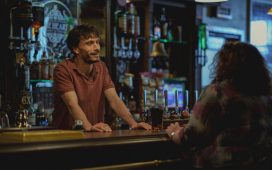“You gotta listen to the screams. You’ve got to look the cost of it in the eye, and tell it to go fuck itself,” Wynonna tells Ginny. Because this is the deal Wynonna seems to have made with herself, the line she has drawn in the sand, and you’ll notice it is very different from what happened with Hoyt Clayborn. She didn’t look Hoyt in the eye. She waited until his back was turned to shoot him, and she seems to think there is no coming back from that. She doesn’t believe she can be with Doc unless he falls down to the dregs of humanity alongside her. “Welcome to the moral low ground,” she tells Doc when she believes he has killed someone, so happy to have a companion once again because she is so damn lonely in her moral failure. But she doesn’t know how to ask for help; she only knows how to keep fighting. “The difference is that you have a way out,” Wynonna tells Ginny because she is so unpracticed at imagining a future for herself guided by self-compassion and forgiveness—these weren’t thinks her daddy taught her.
Meanwhile, Nicole is finally able to face her own ghosts—and I’m (mostly) not talking about that chicken-kicking video. It’s fitting that this episode begins with Wynonna and Nicole doing some friendly sparring because the two mirror one another in some interesting ways in “Crazy.” The difference is: Nicole is much further along working through some of the issues holding her back. She is able to look Doc in the eye and be honest about the mindset that led to making a deal with Margo Clanton, trading Waverly’s safe return for Doc. She admits that she was scared, and she thought Doc would be able to get out of whatever the Clantons had in store for him. She doesn’t say she regrets it because that would probably be a lie—she had to be sure that Waverly would come home—but she listens when Doc rebuts and she apologizes. More importantly, she faces it… and herself.
In the process, she reclaims the town sheriff position. (The democratic process has really fallen by the wayside in Purgatory, huh?) It’s hard for me to get behind Nicole’s return to the uniform as anything other than a plot point driven by characterization. If this series has a major narrative flaw, it’s the lack of specificity in its small town setting. As someone who grew up in the middle of nowhere, I’m always on the lookout for more authentic representations of rural life, and Purgatory is not it. (Though it does get winter right—for obvious reasons.) That being said, I don’t need Purgatory to be authentic, but I do need the setting to have, for want of a better phrase, better character continuity. Wynonna Earp seems to want Purgatory to have a sense of place, but it’s been incredibly erratic, from season to season and sometimes from episode to episode. That someone could live in this town and not know that Doc is a hundreds-year-old vampire or that Waverly is an angel is unlikely. The memory-altering fog hasn’t made it to town… yet.
Speaking of which, Ginny tells Wynonna: “I can stop what’s coming,” implying that yet another Big Bad is on the way—presumably, Eve, whom we haven’t seen since the beginning of the season. It’s too soon to tell and not as much fun to dwell on as other aspects of this meaty scene. We’ve discussed much of it, but not the fact that Wynonna is offered Ginny’s power and seemingly easily refuses. And that’s one of the things that sets Wynonna apart from the villain she is so afraid she has become. Villainy is using the power you have to hurt other people for the sake of securing and/or accumulating that power. It’s what Doug was doing when he started eating people’s brains. (Although that analysis is complicated by the fact that Doug seemed to have some kind of mental illness?) Wynonna has only ever used her power to try to protect others.
The question then becomes: what was Wynonna’s choice to kill Hoyt if not villainy? Is shooting someone in the back to keep them from potentially hurting your family an act of securing power? Does it matter what we call it? Should any one person have the right to decide which demon lives and which demon dies? Wynonna is obviously wrestling with these questions, even if she is unable to articulate them in any real way to herself or her loved ones. The closest she gets is in her conversation with Ginny—a “safe” space to express her feelings as Ginny is about to take them to her grave or hell or wherever she is about to end up. “I get it. I’m poison too,” Wynonna tells Ginny, equating herself with someone who just helped a man slaughter multiple innocent people. It’s yet another sign of just how poorly Wynonna thinks of herself these days, and just how dark this show can get in an episode that also involves another character delightfully yelling “Kristi Yamaguchi!” to a crowded bar.
Additional thoughts.












